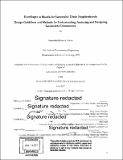Ecovillages as models for sustainable urban neighborhoods : design guidelines and methods for understanding, analyzing and designing sustainable communities
Author(s)
Cohen, Samantha Rebecca
DownloadFull printable version (20.63Mb)
Alternative title
Design guidelines and methods for understanding, analyzing and designing sustainable communities
Other Contributors
Massachusetts Institute of Technology. Department of Urban Studies and Planning.
Advisor
Mary Anne Ocampo and Rafi Segal.
Terms of use
Metadata
Show full item recordAbstract
Ecovillages, which are grassroots intentional communities focused on the shared values of environmental sustainability and community-building, offer an alternative to traditional development primarily focused on developer profit, which creates incentives to build cheaply with little consideration for sustainability, reducing operating costs, creation of community or innovation in building techniques. The problem with modem development practices is that there is an absence of truly sustainable, community-oriented housing options on the market that are economically empowering, socially just, and which enhance the ecology of place by building all forms of capital-- economic capital, social capital, and environmental capital. Ecovillages provide a solution to this, as well as many other 'wicked' problems our society faces-they are blueprints for how communities can live sustainably. This thesis explores the best practices in ecovillage urban design in urbanized and rural settings to improve the design of current and future ecovillages and to use as a design model communities or designers in building sustainable communities, as urban design is inherently linked to sustainability. Through the creation of a matrix of sustainable urban design strategies, this can be used to compare various ecovillages and sustainable communities to understand and analyze how values are embodied in the physical site design or constrained by urban site conditions, and give a process and design guidelines to designers and communities looking to create sustainable neighborhoods or ecovillages.
Description
Thesis: M.C.P., Massachusetts Institute of Technology, Department of Urban Studies and Planning, 2017. Cataloged from PDF version of thesis. Includes bibliographical references (pages 98-101).
Date issued
2017Department
Massachusetts Institute of Technology. Department of Urban Studies and PlanningPublisher
Massachusetts Institute of Technology
Keywords
Urban Studies and Planning.